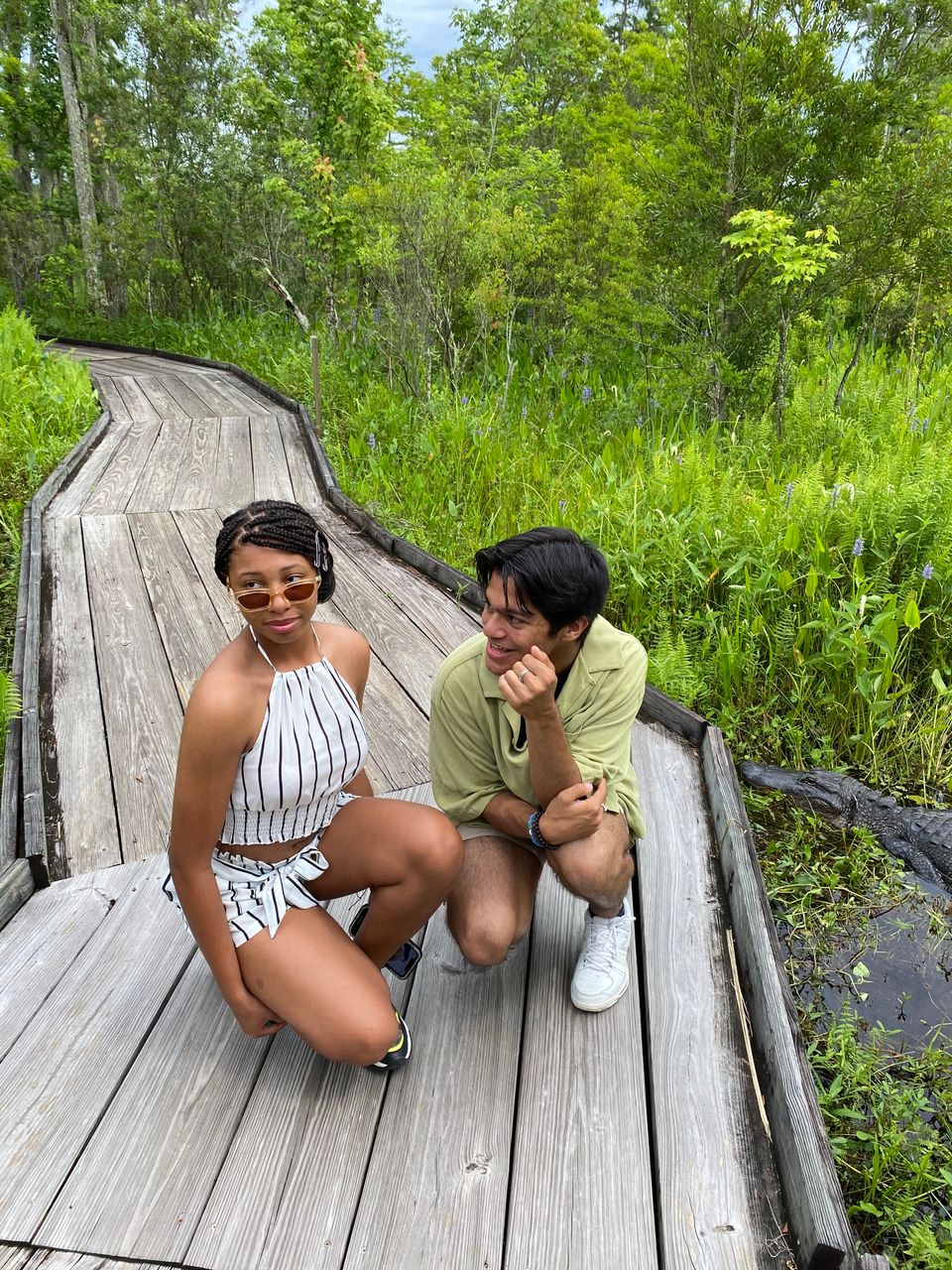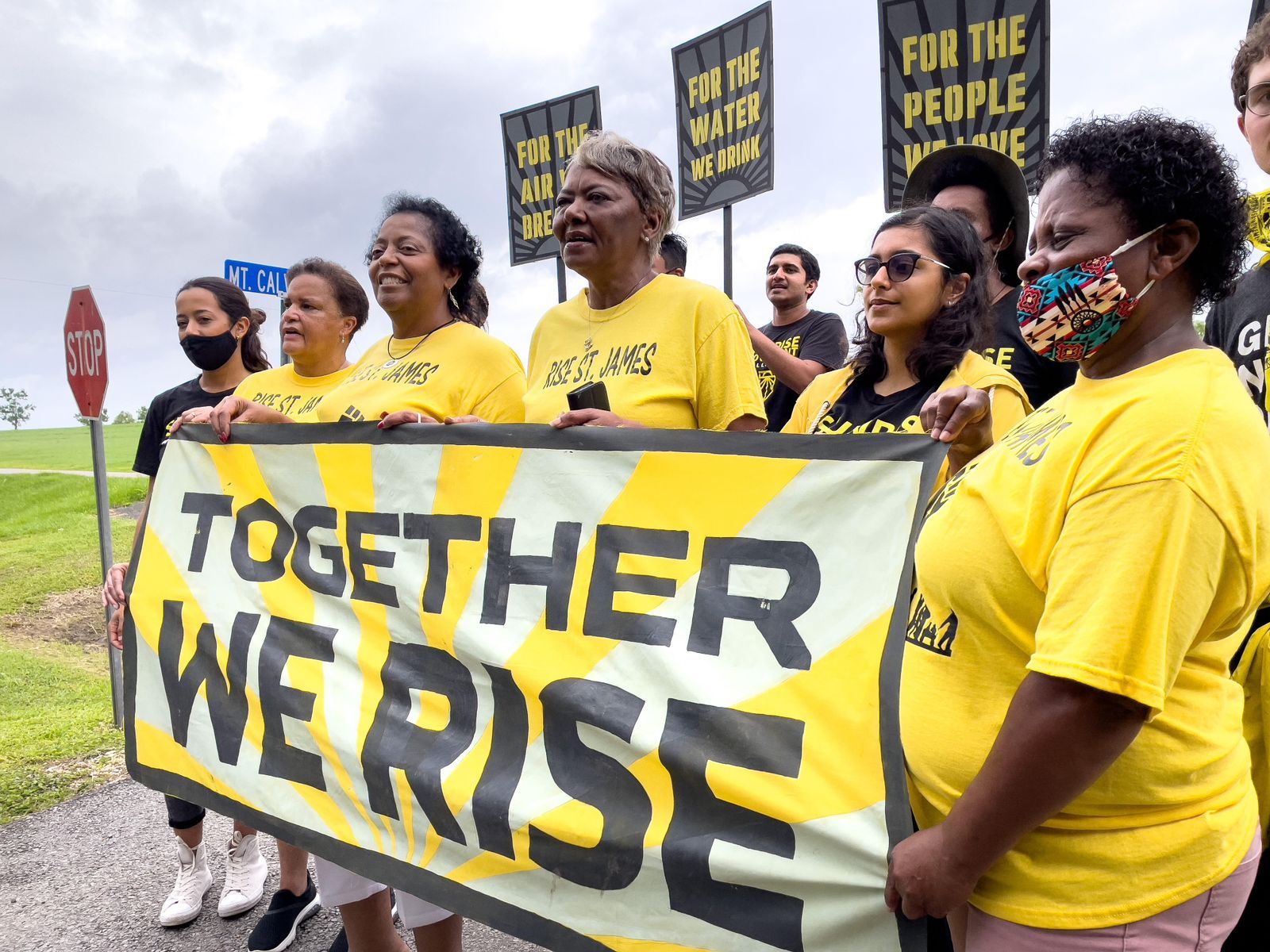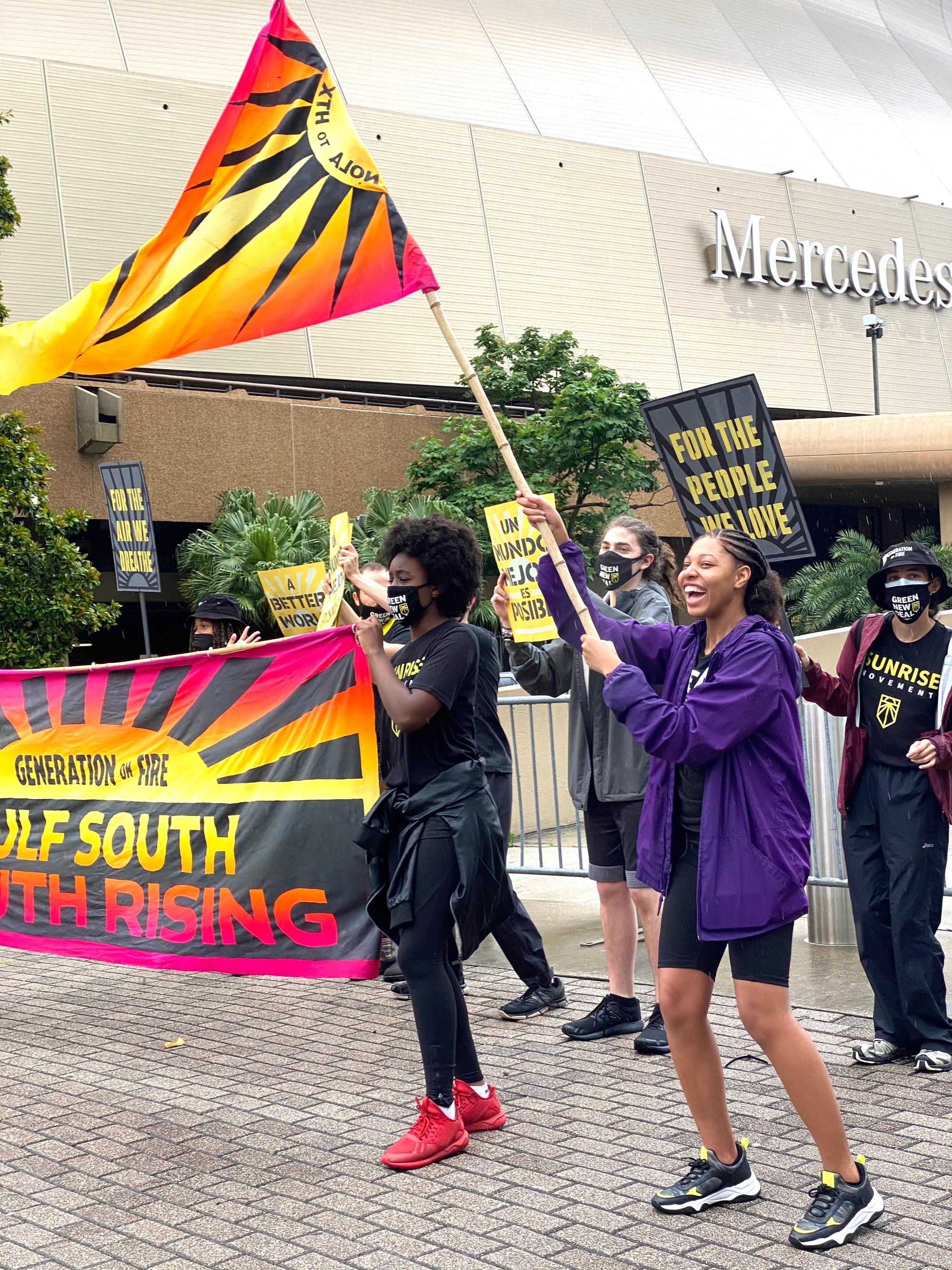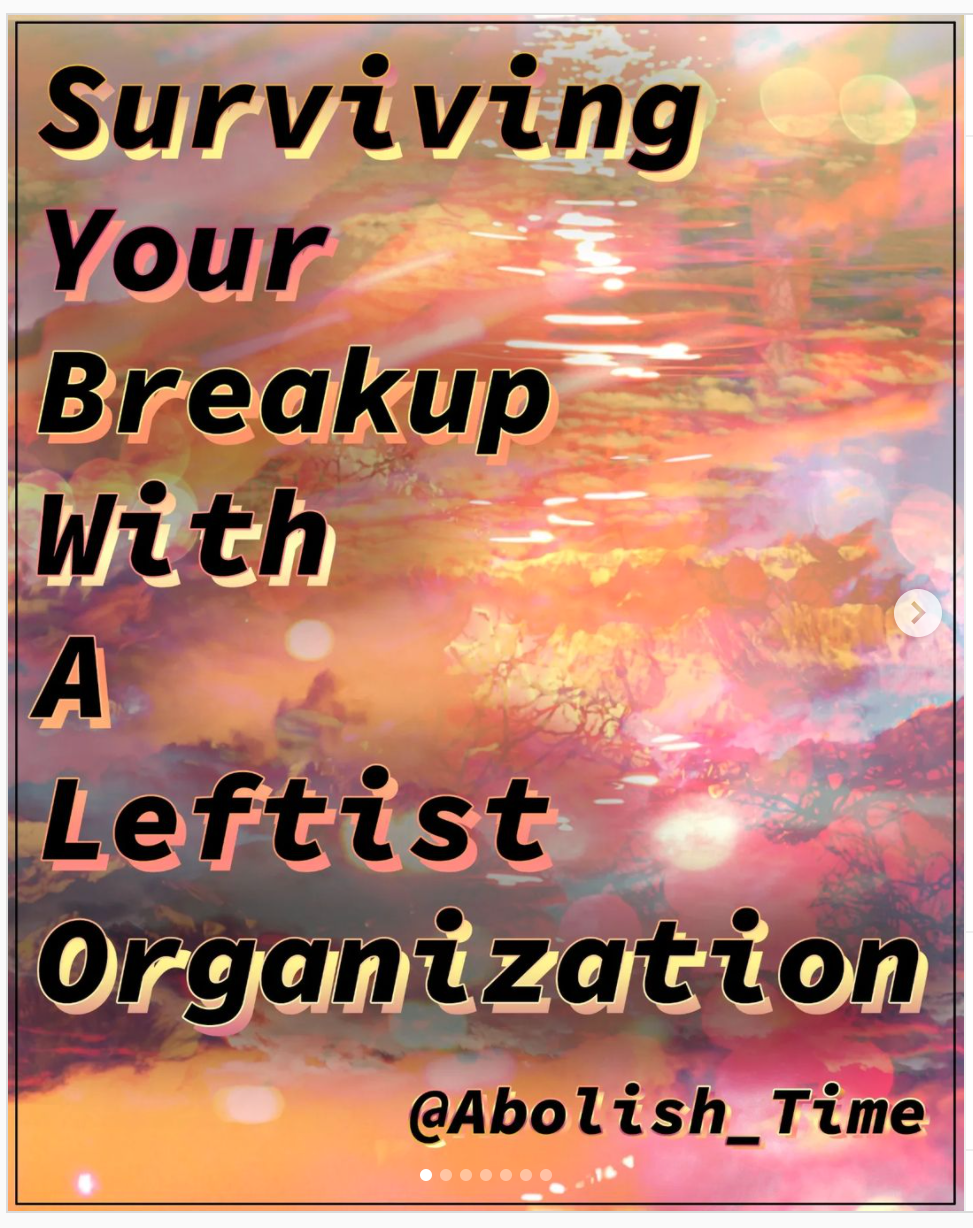epaulette sharks & exploitation

when you start talking about abolition, you get a lot of pushback, even and especially from liberals and folks who purport to be against the system as it is. despite being able to articulate all the ways in which the current system works only to uphold white supremacist capitalism, they will insist that you detail all the ways alternative systems will work before they're willing to consider dismantling the current dysfunction.
in my opinion, this poverty of imagination is what keeps so many of us complicit in upholding the status quo. that's why i started writing what we could become in the first place.
we need reasons to believe things can be different.
as such, i'm shifting this newsletter's format and turing subscriptions back on. i'm bringing back the monday good news. i need it and i think you do too. there will still be one current events centered newsletter a month that rounds up information and resources related to a topic. i'm adding an interview feature a month with someone who is building what Charm Taylor calls "the future south" right now, today. someone who does not purport to have all the answers, but is doing differently to figure it out.
Chanté Davis is home this weekend. Like many weekends, she’s taken the drive from Houston where she currently lives to New Orleans, where she and her family are from. When she was two, they were driven from the ninth ward of New Orleans by Hurricane Katrina and the negligent governmental response that followed.
Chanté describes herself as a climate refugee, a term that’s frequently used to describe future crises or ones that exist elsewhere. For her, nothing about climate crisis is theoretical or distant. Since moving to Houston her family has endured Hurricane Harvey in 2017 and Hurricane Beta and the Texas Freeze in 2020. Though some of her family is still in the New Orleans area, she has never been able to move back.
In 2021, Chanté dreamed up a 400 mile march from New Orleans to Houston to call attention to the on-going crisis in the Gulf South and build community and coalitions along the way. The Sunrise Movement’s national organization threw their financial and political weight behind it. I was moved by her vision and volunteered to manage press.
Originally, I was excited to accompany her and the rest of the twentyish person group on the 400 mile march, but it quickly became clear that the tenor and pace of the organization was not one I was able or willing to meet as a disabled person. I stayed in touch with Chanté and several other organizers on the march since then.
On a Saturday at the end of January 2022, almost half a year after Chanté completed the 400 mile march from New Orleans to Houston, we reunited. Sitting on spinning diner stools at “Coffee &,” a 24/7 bakery and diner in Marrero, Louisiana not far from where Chanté’s sister lives now, we talked and laughed over cinnamon twists and black coffee.
katie wills evans
So you’ve completed this amazing Trek you envisioned and I know it had its ups and downs. What are your thoughts around not just the day to day, but also the mindset behind the whole thing? What did you learn?
Chanté
I definitely learned that a lot of those folks that were in the space, like the staff and northeasterners, coastal elites, were eating, breathing, like living the movement in a way that wasn’t for me. It was always to push the movement. It wasn't paying attention to the needs and the demands of the people here. It felt very invasive because, honestly, those folks shouldn't have been here. They were very distrustful. I remember at one point we were like trying to make a decision and they were like, “folks with more expertise and developed leadership skills should take on most of the heavy decision making” and I was just like, “Wow.” It was just a lot of distrust…
katie wills evans
And condescension it sounds like.
Chanté
Yes. 1,000%.
katie wills evans
Yeah. I think that was something that I felt. There was this tension for me where I wanted to be present and build community and let this thing develop and be what it could be versus the national Sunrise Movement’s goal of marketability.
Chanté
Yes, and it was so crazy because I remember when you brought up white dominant culture and virality and then they completely ignored it, especially towards the end.
katie wills evans
I'm wondering too about how it felt to actually march through so much of the gulf south. Even the two days that I drove the truck and was out on the road, it was just wild to me. I had never seen the actual infrastructure of how oil gets moved through this country. Like holy shit, the entire Mississippi River is lined with oil.
Chanté
Yes, especially when we moved through cancer alley. I see it a lot going between Houston and New Orleans. When we were in Beaumont with the workers who got locked out there, there was a lady that was talking about when she was smaller and she would drive through Beaumont, she would see the large oil reserves and think they were cities and I was like that's so crazy because I would too. I would just wake up and it'd be like, you know, midnight or whatever, we've been driving and I'd see like these big lights and smoke and think, “Oh, that's a city or something.” Now when I'm looking, I'm like, damn, it’s everywhere.

katie wills evans
Yeah. I remember sitting in the car waiting for everybody on the march, and there’s all these beautiful oak trees, you can see people's houses, and then the oil pipelines are just right across the street. It was just such a striking visual for me of like, wow, we were really are fucking this up so desperately for something that is on its last legs anyway. I'm just wondering if y’all had the opportunity to really talk with people and spend time thinking about the omnipresence of this system in the gulf south? Or if the shock of it wore off?
Chanté
Oh, I feel like as far as like outsiders coming in, they definitely had that shock. You know, I've seen it. But I feel like it definitely wore off by the end of it. We went through all this and saw all these communities. We talked with folks when we could, but when they were talking with folks that like weren't like-minded…
katie wills evans
Regular people.
Chanté
Yeah, yeah, they were trying to push the Sunrise narrative and that would like really irk my soul.
katie wills evans
Yeah, we're here to listen not preach.
Chanté
Exactly, exactly. And it was always paid staffers. It's like, you know just ask them how their day is. You don't have to eat, sleep and breathe Sunrise's mission and push it onto folks. The Green New Deal is absolutely a worthy thing to be organizing around, but when it becomes “oh, we're the Sunrise Movement” every five seconds, that was tiring. I feel like it definitely wore off and became, “Oh, that sucks”. And that was a lot of the things that like really got on my nerves, because like I was seeing harm happening, whether it was like to myself or others, and it would always be “Sorry. I didn't mean it.” It was always intent over impact. They had like, this whole media event that they were doing with the California trekkers. And they were like, “Oh, we're gonna go film,” and I stayed because at that point I really was recognizing I was being tokenized. I was beginning to realize, “Oh, God, this doesn't feel right.”
katie wills evans
I think for me, I teach high school because I think like, letting young people lead is the most promising path towards a better future.
Chanté
Yeah.
katie wills evans
But I learned a lot about the necessity of consulting with movement elders along the path who have been seeing these things and been through some of these things, and also just grounding in principles otherwise it becomes like Lord of the Flies.
Chanté
Exactly! (laughs)
katie wills evans
Everything becomes about a goal and not the process.
Chanté
Exactly.
katie wills evans
Chante, I think because you're so poised, people forget your age. And I actually think that's like— and tell me if this feels condescending—but that's something that I try to keep at the forefront with you and a lot of other young organizers. These people are still children. I don't think that people were thought of that way while paid organizers were pushing people to their limits.
Chanté
Yeah.
katie wills evans
Do you have thoughts around what it means to be a young adult, a child, a young organizer? And what that looks like, or should look like, or could look like?
Chanté
Yeah, it was definitely a struggle because there were some decisions I actually wanted to be a part of that I wasn't part of and then there were times when they were asking me to make decisions that I felt like I didn’t have the experience or insight for. Like, I was really at a loss. And then as far boundaries and overworking folks, you know since I have been in Sunrise for so long, I'm used to balancing school and this, that, and the third.
katie wills evans
You have your systems that work for you.
Chanté
Yeah, exactly. But over the trek, I was walking as well. It was a big component. They were asking me to do stuff and I was like this is like causing like undue stress physically, emotionally and mentally.
katie wills evans
Talk to me about how you think about urgency. I felt this huge amount of urgency and, it's obviously urgent right, the Pacific is like... on fire, and shaking, and volcanoes are exploding... it's clearly urgent. But how do you take that urgency and make it something that you can live with?
Chanté
Yeah, wow. As far as urgency goes I try not to get too into my head and I feel like that was ultimately happening on the trek. Urgency culture was always there. When things are urgent, I like to take a step back to think about the things I'm grateful for, think about the things that are going right, and then come together as a collective and say “what is the solution?” That's how I like to address their sense of urgency cause I've felt urgency my my whole life. I'm black so...
katie wills evans
Right, right. Shit ain't new.
Chanté
Exactly and I felt like for them, being in the space really set them off because they were like “oh, we don't see this back home” with like the privileges that they have. And then like it was just like, go, go, go, go, go, 24/7.
katie wills evans
What is your freedom dream for your community? You can define what community means for you—I don't know if you want to talk to like for the Gulf south, for New Orleans, for Houston or what. What is your dream for your community and has it changed since walking through it?
Chanté
Yes, I will say after the trek I feel so connected because for me, being removed from New Orleans it's always been depressing since like I can't move back and whatnot. But after trekking I was so grateful. I felt so closely and spiritually connected to the land, to the people, to the community. I was like, these are my people, especially in St. James Parrish, like I just felt like I returned home. As a matter of fact like walking to Houston, felt like,
katie wills evans
Damn, I’m not even walking home.
Chanté
Yeah exactly. I would say like.. really, Southern Louisiana. Yeah. That's the community.

katie wills evans
So then what's the dream? What's the dream for us then?
Chanté
My dream is really for the youth to see themselves as leaders because I feel that in big cities like Houston, whatnot, young people do see that, but in these communities that have literally been left behind, you know, we have elders holding it down and you do have a few young people that are activated as you can say but not like as much as like, Philly or Boston because they're on survival mode so much. There's a real sense of urgency here because you can really see our futures just being thrown down the drain.
katie wills evans
Right. And sold.
Chanté
Exactly, so yeah, my dream is for them to practice joy as resistance to be able to engage in art and get paid good money like them rich kids and make a job out of that because there's so much art down here. That's something I love from the South. So honestly, my dream is for these people's dreams that have been pushed aside for one thousand and one reasons that shouldn't even be reasons… I want their dreams to be a reality.

katie wills evans
In the build up to the launch we talked a lot about the idea of migration. How do you square this idea of migration and home?
Chanté
As far as migration, for my family migration was a means of survival. I am grateful to be in Houston to have like a stable home now. But you know, if I had a choice of whether I want to migrate, I wouldn't. I've done my best building a community, but it's nothing compared to New Orleans. I think I'm seven or six generations deep, so I have a lot of roots here. And one thing I like think about it's like the fact that I'm African American. So like, I was already removed from my root and from Africa, and then like to to be removed from here to like,
katie wills evans
It's this continual uprooting.
Chanté
Yeah. So, that's one thing I think about, as far as migration, who gets to migrate? Who gets to come back? Who gets to start roots in other places? Who doesn't?
katie wills evans
What thoughts do you have about what it means to come into a place that you don't have roots in? And is there a way to do that that is not harmful?
Chanté
Yeah. I have friends that live down here that are talking to me about moving to Houston because the houses right next to them are Airbnbs, literally. As far as moving to New Orleans because we want to, I don't know. Honestly, I don't even know if you if you can do that in a non harmful way. Like, honestly, for bipoc working class people who moved by chance like me…
katie wills evans
There's not a whole lot of options.
Chanté
Yeah, exactly.
katie wills evans
Are there any projects or organizing work that you're excited about or inspired by?
Chanté
Yeah, I'm definitely inspired by mutual aid projects because, honestly, I'm sick of electoral politics. Especially in the south.
katie wills evans
If Hurricane Ida taught me anything…
Chanté
Oh, my gosh, yeah. I wish we had been doing more coalition building and as I move to a new city for college, I would definitely love to get involved with other organizations and see what happens.
katie wills evans
I love that. Yeah, I think that's the only way that these big organizations like Sunrise have any utility is in supporting coalitions. The only thing that happened where I was grateful for Sunrise's presence—and I say Sunrise as the organization, right, because there were so many people that I am grateful for—was using that national platform and the the links to press to get national attention for Ms. Sharon and the work of RISE St. James.
Chanté
Right.
katie wills evans
So you're 18, you've been a part of several very public facing things. How do you keep the big picture of being at the beginning of an organizing legacy, of a lifetime of organizing?
Chanté
This really is a give and take process. One thing I think about a lot is the fact that I'm so young and I've already made waves, at least like you know, in the media world, and I look forward to still doing this work, hopefully, until I die. When I go into spaces I always think, “How can I plug in? What knowledge can I bring from past mistakes or campaigns and whatnot?” and then I also gravitate towards the elders and other folks who have been doing this work longer than me to see what I can learn from them and how I can get plugged in in a way that will be appropriate. How can I build community? What are the norms? What are the principles that people are thinking about here. One thing I think about is the rise of cloutivism because that was definitely a thing at the end of the trek. It was all, “Oh, how do we go viral?” There were a lot of careerists in the space, so I always try to ground myself and think about my own personal experiences and folks that I've met or even haven't met that have gone through this thing and really try to be a legacy for them, not for these middle class white folks and cool white teens who want to get in on activism so they can put it on their resume and get a career with the EPA. I literally had to fight my college guidance counselor about putting the Teen Vogue article on my application. I was like, “No, I really don't want to do that.” That opportunity arose and I took it, but I didn't go to the trek thinking, “Oh my gosh, like I want to be on Teen Vogue, I'm gonna add all these followers, I'm going to get a viral tik tok.”
katie wills evans
I’m wondering about what traditions you feel like you are a part of?
Chanté
Every time that I think about tradition, I think about my creole culture. I think about second line music. The black version of mardi gras, and I don't want to say just general Mardi Gras…
katie wills evans
We aren't talking about Rex.
Chanté
No, we're talking about NOMTOC! I don't know what y'all talking about (laughs). I think about community, I think about being there for each other, my family and all the things we've been through. I think about cooking and nurturing others. I think about being imaginative, and curious, and creative. And I just think about embracing people as who they are. Like really being grateful for the communities that we built.
katie wills evans
I love that. What’s next for you?
Chanté
It's my life's dream to do research. But like not like white scientists site researchers, more like indigenous research with whale sharks and manta rays, whether that be in the Maldives, or off the coast of Mexico, I honestly don't care. I hope to do that life's work. And then I also hope to bring more black youth into that.
katie wills evans
Do you have any sense of like, what the calling to marine life is for you?
Chanté
When I was seven, I went to a Texas State aquarium and I had my first encounter with an epaulette shark and I was talking to the trainers and they were you know, white girls…
katie wills evans
Blonde ladies.
Chanté
Exactly. And I just remember after that shark, I don't know, I just felt closely connected, because I was like, here's a shark and you know, they were telling us about how they get caught as bycatch and they get finned and so, you know… for sharks that’s a reality and on top of being exploited, the media paints a bad picture of them. So, as a black woman, I felt like connected to that.
katie wills evans
Kinship.
Chanté
Yeah, because they paint you as the bad guy, but then they turn around and exploit you in like do stuff behind the scenes. And you know, sharks are apex predators. They're important to biodiversity, to our ecosystems, and they are less talked about. People are talking about like, sea turtles and plastic straws, but they don't talk about like sharks populations are depleting as well. I want to work on that.
katie wills evans
Damn. This is my closing question. If you had a magic wand. You can do one thing? What do you do?
Chanté
For me, I hope I can move back here to New Orleans and establish my own roots. I do hope to be back in Bulbancha and have my family here and have everyone be stable, whatever that looks like.
To send Chanté funds to support her summer trip to study and conserve marine life in Mexico and her transition to Duke University, you can venmo: @chante-davis-7

grateful to have you here & as always, i hope it was useful.
if it was and you've got five bucks a month to spare, click here.
with hope,
katie wills evans
